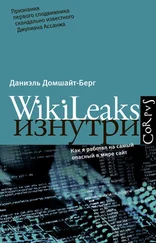Harding, Luke - WikiLeaks - Inside Julian Assange's War on Secrecy
Здесь есть возможность читать онлайн «Harding, Luke - WikiLeaks - Inside Julian Assange's War on Secrecy» весь текст электронной книги совершенно бесплатно (целиком полную версию без сокращений). В некоторых случаях можно слушать аудио, скачать через торрент в формате fb2 и присутствует краткое содержание. Жанр: Старинная литература, на английском языке. Описание произведения, (предисловие) а так же отзывы посетителей доступны на портале библиотеки ЛибКат.
- Название:WikiLeaks: Inside Julian Assange's War on Secrecy
- Автор:
- Жанр:
- Год:неизвестен
- ISBN:нет данных
- Рейтинг книги:3 / 5. Голосов: 1
-
Избранное:Добавить в избранное
- Отзывы:
-
Ваша оценка:
- 60
- 1
- 2
- 3
- 4
- 5
WikiLeaks: Inside Julian Assange's War on Secrecy: краткое содержание, описание и аннотация
Предлагаем к чтению аннотацию, описание, краткое содержание или предисловие (зависит от того, что написал сам автор книги «WikiLeaks: Inside Julian Assange's War on Secrecy»). Если вы не нашли необходимую информацию о книге — напишите в комментариях, мы постараемся отыскать её.
WikiLeaks: Inside Julian Assange's War on Secrecy — читать онлайн бесплатно полную книгу (весь текст) целиком
Ниже представлен текст книги, разбитый по страницам. Система сохранения места последней прочитанной страницы, позволяет с удобством читать онлайн бесплатно книгу «WikiLeaks: Inside Julian Assange's War on Secrecy», без необходимости каждый раз заново искать на чём Вы остановились. Поставьте закладку, и сможете в любой момент перейти на страницу, на которой закончили чтение.
Интервал:
Закладка:
Crescent, Oklahoma, is flat and off the beaten track, just like the Mada’in Qada desert. But there the likeness ends. A small town in the middle of a rural bread basket, 35 miles to the north of Oklahoma City, its skyline is dominated by a large white grain stack. “This is a tight-knit, very conservative community,” says Rick McCombs, the recently retired principal of Crescent high school.
Born on 17 December 1987, Bradley Manning spent the first 13 years of his life in Crescent, benefiting from its small-town intimacy, suffering from the narrow-mindedness that went with it. He lived outside town in a two-storey house with his American father, Brian, his Welsh mother, Susan, and his elder sister, Casey. His parents had met when Brian was serving in the US navy and stationed at the Cawdor Barracks in south-west Wales.
From a young age, Bradley displayed the dual qualities that would set him apart from others and set him on a path that would lead, tragically for him, to a locked cell in Quantico marine base, Virginia. He possessed a lively inquiring mind and a tendency to question the prevailing attitude. McCombs recalls that Bradley not only played a mean saxophone in the school band but also appeared in the school quiz team alongside much older children. “He was very, very smart. He was also very opinionated – but only up to a point. He never got in trouble. Not once was Bradley disciplined for any reason.”
Manning had an early passion for computer games, playing Super Mario Bros with a neighbour. He was also fiercely independent of spirit. He was one of very few inhabitants of Crescent who openly professed doubts about religion – not an easy position for a child to take in a devoutly Christian town with no fewer than 15 churches. He used to refuse to do homework that related to the Bible and remained silent during the reference to God in the Pledge of Allegiance. Crescent, Manning once quipped, had “more pews than people”.
From his father, who spent five years in the navy working on computer systems, Bradley inherited two important qualities: a fascination for the latest technology, and a fervent patriotism and belief in service that would stay with him despite the harrowing treatment he was to experience later at the hands of the military police. In one of the few statements he has been allowed to make since his arrest in May 2010, Manning put out a message on Christmas Eve 2010 in which he asked his supporters to take the time “to remember those who are separated from their loved ones at this time due to deployment and important missions”. He even spared a thought for his jailers at Quantico Confinement Facility “who will be spending their Christmas without their family”.
His father was by all accounts a strict parent. Neighbours reported that Brian’s severity contributed to Bradley growing introverted and withdrawn. Such introversion deepened with puberty and Bradley’s dawning realisation that he was gay. Aged 13, he confided his sexuality to a couple of his closest friends at Crescent school.
The entry to teenage years was a tumultuous time. In 2001, just as Manning was beginning to come to grips with his homosexuality, his father returned home one day and announced he was leaving his mother and the family home. Within months, Manning’s life in Crescent had been uprooted, his friendships torn asunder, and his life transplanted 4,000 miles to Haverfordwest in south-west Wales, where his mother decided to return following the bitter break-up.
In Wales Manning had to acclimatise to his new secondary school, Tasker Milward, which, with about 1,200 pupils, was the size of his old home town. And he was its only American student.
“He was prone to being bullied for being a little bit different. People used to impersonate him, his accent and mannerisms,” remembers Tom Dyer, a friend of Manning’s at Tasker Milward. “He wasn’t the biggest kid, or the most sporty, and they would make fun of him. At times he would rise to the provocation and lash out.”
Perhaps as a means of reviving his self-esteem, he grew increasingly passionate about computers and geekery. He spent every lunchtime at the school computer club, where he built his own website.
“He was always doing something, always going somewhere, always with an action plan,” says Dyer. “He would get exasperated if things went wrong, his mind always racing. That made him come across as a little bit quirky and hyperactive.”
Dyer also notes that by the age of 15 Manning had begun to formulate a clear political outlook that, irrespective of his enduring patriotism, was increasingly critical of US foreign policy. When the invasion of Iraq happened in March 2003 they would have long conversations about it. “He would speak out and say it was all about oil and that George Bush had no right going in there.”
That political sensibility developed further when, at the age of 17 and having left school, he was packed off back to Oklahoma to live with his father. He took up a job in Zoto, a photo-sharing software company.
“He struck me as wise beyond his years,” recalls Manning’s boss at Zoto, Kord Campbell. “This was the Bush era, and nobody in the computer software world liked that president. Brad would go on about his political opinions, which was unusual for a kid.”
Campbell says that his employee “was smart. He learned like nobody’s business.” But the maverick side to Manning was also growing more pronounced. “He was quirky, there was no doubt about it. He was quirky as hell.” On a couple of occasions he remembers Manning falling into what Campbell describes as a “thousand-mile stare”. “He would be silent and wouldn’t talk to me or recognise me.” Four months in, concerned that Manning’s personal issues were affecting his work, Campbell fired him.
After discovering that Bradley was homosexual, Brian Manning threw his son out of the house. Homeless, jobless, Bradley rambled around for a few months, moving from place to place, odd job to odd job. As Jeff Paterson, a member of the steering committee of the Bradley Manning support network, puts it: “He needed a way of proving himself, to go out on his own, to establish himself.”
After a few months of aimlessness the solution came to him: Bradley Manning would follow in his father’s footsteps and volunteer for the US military. He enlisted in October 2007, and was put through specialist training for military intelligence work at Fort Huachuca in Arizona. Upon graduation in August 2008 he was posted to Fort Drum in upstate New York, awaiting dispatch to Iraq, armed with the security clearance that would give him access to those two top-secret databases.
For someone seeking a sense of purpose out of a career in the military, his experience of life in uniform was at times disillusioning. He complained of having been “regularly ignored … except when I had something essential … then it was back to ‘bring me coffee, then sweep the floor’ … I felt like an abused workhorse.” On another occasion, on Facebook, he wrote: “Bradley Manning is not a piece of equipment.”
On top of feeling like a menial, there was Don’t Ask, Don’t Tell, the unhappy compromise thrashed out by the Clinton administration in 1993 that allowed gay personnel to serve in the military but only if they remained in the closet. Though Manning must have been aware of the restrictions when he enlisted, he quickly became infuriated and distressed by the policy. In an echo of his occasional outbursts at Tasker Milward school, he at times let his frustration show, coming close to flouting the Don’t Tell half of the formula.
The motto he attached to his Facebook profile said it all: “Take me for who I am, or face the consequences.” That devil-may-care approach was on display within weeks of his posting to Fort Drum, when he marched at a rally to protest against the Proposition 8 vote in California which prohibited same-sex marriage.
Читать дальшеИнтервал:
Закладка:
Похожие книги на «WikiLeaks: Inside Julian Assange's War on Secrecy»
Представляем Вашему вниманию похожие книги на «WikiLeaks: Inside Julian Assange's War on Secrecy» списком для выбора. Мы отобрали схожую по названию и смыслу литературу в надежде предоставить читателям больше вариантов отыскать новые, интересные, ещё непрочитанные произведения.
Обсуждение, отзывы о книге «WikiLeaks: Inside Julian Assange's War on Secrecy» и просто собственные мнения читателей. Оставьте ваши комментарии, напишите, что Вы думаете о произведении, его смысле или главных героях. Укажите что конкретно понравилось, а что нет, и почему Вы так считаете.












